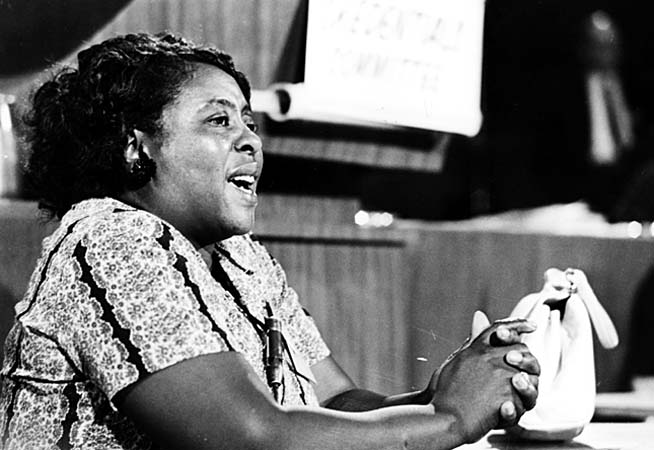Kingdom Women: Fannie Lou Hamer--Southern Grit by Melody Copenny
This is part of an ongoing series on Kingdom Women—women God has used and is using in His great Kingdom endeavor. We will meet these women in God’s Word, in the early church, in the dark ages, in the past great missionary efforts and among today’s true followers of Jesus. My friend Melody Copenny introduces us to a woman who demonstrated true southern grit in the civil rights movement.
“One day I know the struggle will change. There's got to be a change—not only for Mississippi, not only for the people in the United States, but people all over the world.”
“You don't run away from problems—you just face them.”
“I am sick and tired of being sick and tired.”
“Nobody's free until everybody's free.”
“I feel sorry for anybody that could let hate wrap them up. Ain't no such thing as I can hate anybody and hope to see God's face.”
Fannie Lou Hamer said what she meant and meant what she said. She spoke the truth. She was the kind of woman who reminds me of my grandmother: strong, determined, and with an “I don’t take no mess from nobody” type of sensibility.
It takes grit to face hopeless.
Many African American southern women are like this, whether they come from the red clay country roads of Georgia, like my grandmother Lena, or the delta lands of Mississippi, like Fannie Lou Hamer. You needed that grit to get you through days that felt hopeless. You needed that gumption to push you forward. You had to keep going to give life to dreams about futures that could be better for those coming after you.
Jim Crow laws and racial segregation were the way of life in the American South the first half of the 20th century. State laws that upheld discrimination simply because one’s skin was dark and race was black imposed decades of unfair living conditions and unequal education. These laws dug daily into the mental and emotional psyche of African Americans dwelling below the Mason-Dixie line.
The constitutional right to vote that all Americans have was denied regularly to African Americans living in the South during this time. Fannie Lou was one of those Americans. The daughter of sharecroppers born in 1917 and a sharecropper herself, she and her husband Perry worked in a system that modeled the economic trappings of Southern slavery decades earlier. Sharecroppers were physically free, but were bound financially in chains to those who owned the land they farmed their crops on. Fannie Lou faced the challenges of this system and the poverty that came with it.
“You don't run away from problems—you just face them.”
In 1961, Fannie Lou had surgery to remove a tumor. During the procedure an unauthorized hysterectomy was performed on her, stripping away her chances to have children naturally. Her American Experience biography details: “She was given a hysterectomy while in the hospital for minor surgery, a procedure so common it was known as a “Mississippi appendectomy.”
“[In] the North Sunflower County Hospital, I would say about six out of the 10 Negro women that go to the hospital are sterilized with the tubes tied,” she told a Washington, DC audience three years later.”
“The forced sterilization was one of the moments that set Hamer on the path to the forefront of the Mississippi Civil Rights movement.”
She connected with voting rights meetings led by the Student Nonviolent Coordinating Committee (SNCC) and attempted to register to vote with a group of her neighbors in August 1962. They were not allowed to register and on the trip back home, their bus was stopped.
It takes grit to face fear.
Writer Charles Marsh details the account of Charles McLaurin, a SNCC worker who knew Fannie Lou, and the legitimate fears of the passengers in his Washington Post article, “God’s Long Summer:”
“The driver was arrested on the charge of operating a bus that too closely resembled a school bus, and he was taken to jail, leaving the rest of the people alone to contemplate their prospects for a safe return home. Everyone became frightened, McLaurin recalls.”
“They didn't know whether they were going to have to sit out there on the road or whether in a few minutes the police were going to come back and put everybody in jail."
“Then Fannie Lou Hamer, standing toward the back of the bus, started to hum, then sing,
Have a little talk with Jesus
Tell him all about our troubles,
Hear our feeble cry,
Answer by and by,
Feel the little prayer wheel turning,
Feel a fire a burning,
Just a little talk with Jesus makes it right.
“Soon the others followed the lead of her deep, strong voice, and the group sang through their fears. They sang other songs as well: "This Little Light of Mine," "Freedom's Coming and It Won't Be Long," "Down by the Riverside." Someone shouted with delight, ‘That's Fannie Lou, she know how to sing.’”
Her singing ingenuity brought a new dynamic to the Civil Rights Movement, ushering in the use of Negro spirituals to build morale among protesters. This morale blew hope into the hearts of people who were ready to see America give freedom to all of her citizens.
“Nobody's free until everybody's free.”
In 1964, Fannie Lou gave a powerful testimony at the Democratic National Convention, urging the convention’s Credentials Committee to consider an integrated delegation, which included her, versus an all-white, pro-segregation Mississippi delegation that was in place. She also ran for Congress that same year.
Fannie Lou was a woman of faith, kingdom minded and socially conscious who fought for the rights of others, specifically those from the Mississippi Delta. She knew what it felt like to be tried and tired, beat down and broken.
She endured assaults and arrests just to secure her right to vote and the rights of others. But like 2 Corinthians 4:7-9 illustrates, in all of this she wasn’t destroyed. She wasn’t without hope. This kingdom woman fanned the flames of hope in the hearts of many others. She helped them find their own true grit, as her bio illustrates:
“Tracy Sugarman, who spent the summer in Mississippi as both a volunteer and a journalist, accompanied Hamer as she visited Delta churches to encourage parishioners to register to vote. “Mrs. Hamer rose majestically to her feet,” he wrote.
“Her magnificent voice rolled through the chapel as she enlisted the Biblical ranks of martyrs and heroes to summon these folk to the Freedom banner. Her mounting, rolling battery of quotations and allusions from the Old and New Testaments stunned the audience with its thunder.”
Fannie Lou received several honorary degrees, including a Ph.D from Howard University before she passed in 1977.
Southern grit, true grit, in its best form. That’s Fannie Lou Hamer. I’m proud to be a part of her legacy as an African American woman, a Southern woman, and a kingdom woman.
Like Fannie Lou, how is God using you to fan flames of hope in the hearts of others? How can you bring change to your community and this world beyond the walls of your church? Excerpts taken from:
PBS: Freedom Riders
http://www.pbs.org/wgbh/americanexperience/freedomriders/issues/jim-crow-laws
The History Channel: Sharecropping
http://www.history.com/topics/black-history/sharecropping
American Experience: Fannie Lou Hamer
http://www.pbs.org/wgbh/americanexperience/features/biography/freedomsummer-hamer/
God’s Long Summer
http://www.washingtonpost.com/wp-srv/style/longterm/books/chap1/godslongsummer.htm
American Experience: Fannie Lou Hamer’s Powerful Testimony
Melody Latrice Copenny is a poet, writer, author and storyteller living a gospel-centered life. An Atlanta native, she resides in Orlando and writes to be real, relevant and reveal. She’s a journalist and communicator for Cru, serving with the Writers Team where she covers national and international stories with themes of hope and eternity in mind.
Melody’s passionate about helping grievers grieve well as they walk through “the valley of the shadows” and shares her healing through this journey at Finding Melodie. A lover of the hot mess alert, she enjoys a flexitarian-pescatarian-vegetarian lifestyle with hints of vegan tastes, running 5K and 10K races with her Black Girls Run! sole sisters and listening to classic soul, funk and R&B music.
You can view her active digital footprints at Cherished Women, Missionary Writer, The Gram and Twitterland.




